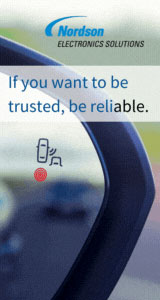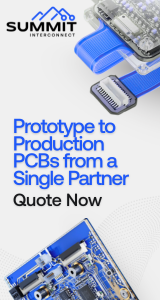| Sponsor |

|
Electronic Assembly Cleaning Basics
Monitoring & effectively controlling chemistry concentration when cleaning electronic assemblies is crucial for maintaining optimal cleanliness results & preventing costly consequences.
KYZEN
|
|
| Sponsor |

|
Reinforce Critical Components on PCBs
UV-curable, low-modulus ruggedizing adhesives secure BGAs/VGAs, improving shock & vibration resistance of electronic assemblies. Low-outgassing version available.
Dymax
|
|
| Ask the Experts |
|
|
November 27, 2006 - Updated
July 4, 2007 - Originally Posted
Wave soldering lead-free components
We are using components which are lead-free and tin-lead in printed circuit board assembly. Please help me understand the proper wave soldering temperature, for soldering, using lead/tin solder for lead-free components? What is the correct hand soldering temperature setting for such boards?
Veerendra Kumar Sing
|
| Expert Panel Responses |
Tin and silver finishes have been widely used for both surface mount and through hole components for many years due to their slow oxidisation characteristics and therefore long shelf life. So the simple answer is that you can use the same pot and solder iron temps that have always been used.
When the molten solder from a Sn/Pb pot comes in contact with the higher melting point lead free metals on the components they will melt and dissolve. The pot temp used will be around 245 - 255 for Sn/Pb which is higher than the 232 temp of the highest metal finish (pure tin) and will cause localised melting. Also the solder dissolves the surface of the component much in the same way as it would the copper finish on an osp board, The copper melts in excess of 1000 degrees but still solders well most of the time.
The whole solder process relies on metal dissolution and chemical bonding to work not melting.
Solder Irons remain the same for the same reason and also because they are at about 380 centigrade. Again this is plenty of heat to melt a lead free alloy. What we have found in Europe is that even with lead free wire that you can keep the same temperature but reduce the diameter of the wire to the next available size down. This ensures that there is no increased risk of temp damage to the components around where the hand solder process is taking place and the soldering speed is the same.
Doug Dixon
Marketing
360-Biz
Douglass Dixon is the Chief Marketing Officer for 360 BC Group, a marketing agency with offices throughout the US. 360 BC specializes in consulting and implementing successful marketing programs that utilize the latest in marketing, sales and technology strategies. As an electronics veteran, Dixon has worked in the industry for over 30 years for companies like Henkel, Universal Instruments, Camelot Systems, and Raytheon. Dixon's electronics industry experience includes a broad skill set that includes engineering, field service, applications, product management and marketing communications expertise.
|
|
Submit A Comment
|
Comments are reviewed prior to posting. You must include your full name to have your comments posted. We will not post your email address.
|
Free Newsletter Subscription
Circuitnet is built for professionals who bear the responsibility of looking ahead, imagining the future, and preparing for it.
Insert Your Email Address
|
| Sponsor |

|
Plasma as a Key Technology
Plasma technology improves electronics manufacturing, reduces oxide layers, prevents delamination & enables environmentally friendly products by using Openair-Plasma ® & PlasmaPlus®.
Plasmatreat GmbH
|
|
|





